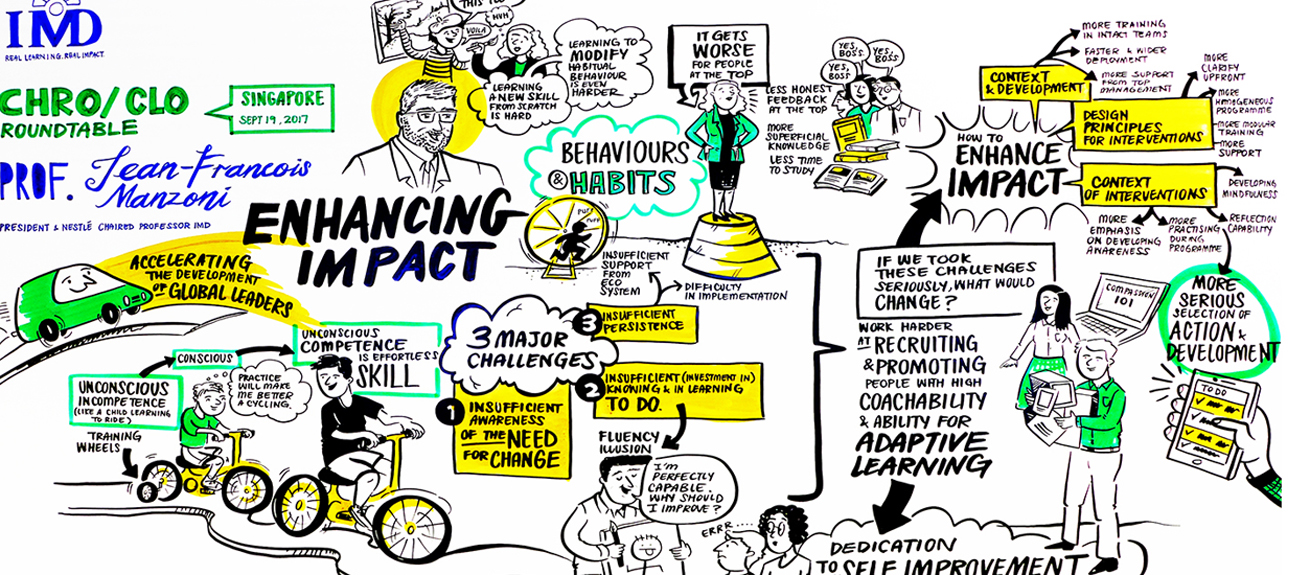
A group of Singapore’s Human Resources and Leadership development industry leaders gathered this month at the IMD Southeast Asia Executive Learning Center with President Jean-Francois Manzoni to deliberate on the theme Enhancing Impact – Accelerating the development of global leaders. The event was a deep-dive into how the learning sector can amplify their role in helping senior management to change to meet today’s challenges.
A core value advocated in IMD’s human capital syllabus is that the best predictor of success lies in the executive leader’s ability to keep learning over their lifespan. Professor Manzoni uses this premise to kick off the discussion, outlining how C-suite learning often stalls once the level of expertise is attained and how awareness is the first crucial step out of the cloud of the ‘fluency illusion’ that years of expertise often brings.
For C-suite, Manzoni outlinesthree challenges executives face in developing new capabilities:
a) Lack of awareness of a need for change – which automatically leads to little efforts made towards new experiences and learning
b) Insufficient bandwidth to absorb new information due to energy, time, and business priorities
c) Little persistence in creating new habits. When breakthroughs happen, underpinned by an awareness to learn new capabilities, it often is lost due to lack of a supportive eco-system to sustain these newfound efforts
A lot of senior leaders narrate a self-fulfilling prophecy that they can’t adapt to further change because it’s not “in their DNA”
Today, senior leaders are very conscious of their capabilities on how to excel in their corporate role. Ironically this expertise often gets in the way of learning new behaviors – executives don’t invest enough time in learning new habits, they typically find it hard to implement new knowledge and instead, keep repeating known patterns.
For C-suite executives in particular, “Learning any new skill from scratch is hard, but learning to modify established behavior is even harder.” Manzoni explains, “Most of the time you are on auto-pilot which doesn’t allow for the needed change or development. As a result, it’s not only the leader who loses out but often their business is affected.”
How effective human capital investment can remove roadblocks to leaders’ success
Turning the dilemma to the learning & development leaders from Singapore’s public and private sector companies in the room, Manzoni asks “So how do we help executives embrace the need to learn, or re-learn skills, despite their years of expertise? How do we enhance their impact? Repeated interventions,” he says. Interrupting the status quo is what Manzoni refers to as an “intervention”, where leaders create a space to develop an awareness and mindfulness capability in their workday, to create real change in long-standing behaviors.
Manzoni then offers an opportunity for the learning and development sector experts to empower their role. The community they represent is crucial as a supportive eco-system for employees to create a real change in behavior. This can be done by developing a mandate to recruit and promote people with high coachability and ability for adaptive learning.
Ending on a philosophical note that echoes the mindfulness capacity, Manzoni concludes “Only leaders dedicated to self-improvement, with focus and practice, are truly capable of bringing a company continued success”. Einstein’s wise words still hold true in the modern era of disruption: “Insanity is repeating the same behavior and expecting a different outcome.”


